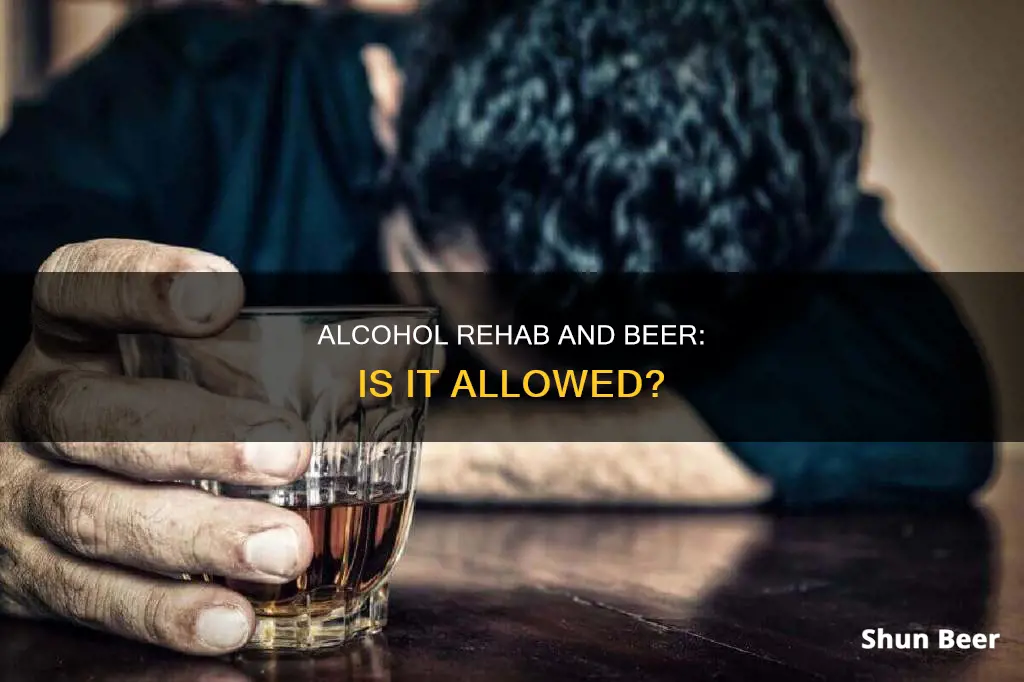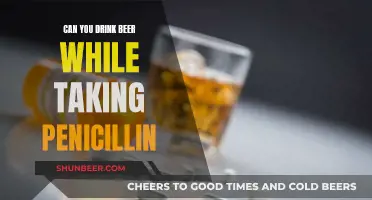
Alcohol addiction, or alcoholism, is a disease that affects people from all walks of life. It can be challenging to recognise due to its widespread availability and acceptance in many cultures. Treatment for alcohol addiction can be complex, and success depends on the person's desire to get better. Inpatient rehab programs can last anywhere from 30 days to a year and provide 24/7 care and support, while outpatient treatment allows the person to live at home while receiving daily support. During rehab, individuals may undergo detox, behavioural therapy, individual counselling, and education. While non-alcoholic beer is an option for some, it is not recommended for those in recovery from alcohol addiction as it may trigger a relapse.
| Characteristics | Values |
|---|---|
| Can someone in rehab for alcohol drink non-alcoholic beer? | There is no clear consensus. Some say it is a personal decision, while others say it is a relapse. |
| Non-alcoholic beer | Beer with less than 0.5% ABV is considered non-alcoholic. |
| Alcoholics' motives for drinking non-alcoholic beer | Some alcoholics enjoy the taste of beer, while others want to feel included in social events. |
| Risks of drinking non-alcoholic beer | It can trigger euphoric recall, leading to relapse. |
| Tips for staying sober | Joining peer support groups, developing a relationship with a sponsor, exploring therapy options, and understanding triggers are some ways to stay sober. |
What You'll Learn

Non-alcoholic beer still contains alcohol
Non-alcoholic beer is often marketed as a safe alternative to alcoholic drinks, and it can be a good option for people who want to cut down on their alcohol consumption. However, it's important to remember that non-alcoholic beers are not completely alcohol-free. By law, non-alcoholic beers can contain up to 0.5% alcohol by volume (ABV). While this is a very small amount, it is still alcohol, and it can be a trigger for people with alcohol use disorders.
The amount of alcohol in non-alcoholic beer varies, and some may contain more alcohol than they claim on their labels. A 2010 study found that 29% of no- or low-alcohol beers tested had higher alcohol levels than stated, and 6 out of 45 zero-alcohol beers sampled contained more than 1% alcohol. This means that non-alcoholic beers may pose risks to people who are pregnant or trying to conceive, as well as those recovering from alcohol use disorders.
The smell and taste of non-alcoholic beer may be enough to trigger cravings and a subsequent relapse, as it can bring back memories of drinking. This is known as "euphoric recall" and can be a powerful trigger for people with alcohol use disorders. Additionally, the ritual around drinking can be almost as addictive as the alcohol itself, and the taste of non-alcoholic beer is very similar to regular beer.
For these reasons, it is generally recommended that people in recovery from alcoholism avoid non-alcoholic beer and other alcoholic beverages. However, some people in recovery may choose to consume non-alcoholic drinks as a way to feel included in social situations. The decision to consume non-alcoholic beer is a personal one, and it is important for individuals to be aware of their triggers and make informed choices about their recovery.
The Michigan Beer Chair: Engineering a Relaxing Experience
You may want to see also

The risks of non-alcoholic beer for recovering alcoholics
Non-alcoholic beer is often marketed as a safe alternative to regular beer, but it can pose serious risks for people recovering from alcohol addiction. While it may not cause intoxication, non-alcoholic beer can trigger powerful cravings and set the stage for a relapse. Here are some of the dangers that recovering alcoholics should be aware of:
It Still Contains Alcohol
Although it is a minimal amount, most non-alcoholic beers contain up to 0.5% alcohol by volume (ABV), and some may have even higher levels than advertised. This means that drinking non-alcoholic beer can potentially lead to a relapse, as it can pave the way for rationalizing having a stronger drink. The alcohol content, no matter how small, can undo years of progress and lead a recovering alcoholic back into the cycle of addiction.
Sensory Triggers
The look, smell, and taste of non-alcoholic beer are virtually identical to those of regular beer. This sensory experience can be a significant trigger for someone in recovery. The smell of beer alone may be enough to trigger cravings and a subsequent relapse. The similar sensory experiences associated with non-alcoholic beer can cause frustration for someone trying to maintain sobriety.
Euphoric Recall
Non-alcoholic beer can trigger a condition known as euphoric recall, a form of selective memory where a recovering addict glamorizes their active addiction while ignoring the negative consequences. The familiar sensory cues of beer can evoke memories of the "good times" of drinking, making it difficult for a recovering alcoholic to remember the negative impacts their addiction had on their life.
A Slippery Slope
For a recovering alcoholic, drinking non-alcoholic beer can be a slippery slope. Even though it won't get them drunk, the urges and triggers it creates can be too powerful to resist. It can be challenging to stop at just one non-alcoholic beer, and it may lead to a desire for stronger drinks.
Behavioral Crutch
Recovering alcoholics must work every day to avoid a relapse, and that includes avoiding the people, places, and things associated with their drinking habit. Drinking non-alcoholic beer can become a behavioral crutch, allowing them to feel included in social situations without actually consuming alcohol. However, it does not address the underlying issues that led to the addiction in the first place.
Individual Differences
The decision to consume non-alcoholic beer during recovery is a personal one and will depend on individual factors. Some recovering alcoholics may find that it helps them feel included during social occasions without putting their sobriety at risk. Others may find that it triggers cravings and reminds them of their past struggles with alcohol addiction. It is crucial to assess your own triggers and consult with healthcare professionals or support groups to determine if non-alcoholic beer is suitable for your recovery journey.
Beer and Periods: Is It Safe to Drink?
You may want to see also

The psychological dangers of non-alcoholic beer
Non-alcoholic beer is often marketed as a healthier alternative to alcoholic beer, but it is important to be aware of the psychological dangers it may pose, especially for individuals in recovery from alcohol addiction. Here are some key points to consider:
Risk of Relapse
The taste, smell, and appearance of non-alcoholic beer can trigger powerful memories and cravings for those in recovery from alcohol addiction. This is known as "euphoric recall", where individuals may romanticize the positive aspects of drinking while minimizing or forgetting the negative consequences. The ritualistic behaviour associated with drinking beer can be a powerful trigger and lead to a full-blown relapse.
Misleading Marketing
Some non-alcoholic beers are labelled as completely alcohol-free, which can be misleading. By law, in most countries, non-alcoholic beers can contain up to 0.5% alcohol by volume (ABV). This small amount of alcohol can still have an impact, especially for those who are sensitive to alcohol or have medical conditions that prohibit any alcohol consumption. The misconception that non-alcoholic beer is completely alcohol-free can lead individuals to unknowingly compromise their recovery.
False Sense of Security
The presence of alcohol, even in small amounts, in non-alcoholic beer can create a false sense of security. Individuals in recovery may feel that they can consume larger quantities without consequences, which is dangerous. This false sense of security can lead to a slippery slope where the line between non-alcoholic and alcoholic beers becomes blurred, increasing the risk of relapse.
Social Pressure and Perception
Non-alcoholic beer allows individuals to participate in social drinking traditions, but it can also create social pressure and subtle expectations to drink. This can be challenging for those who have chosen not to drink for health or personal reasons, as they may feel pressured to consume alcohol to fit in with their social group. The community risks of non-alcoholic beers go beyond individual risks and can reinforce drinking habits and encourage others to drink more than intended.
Individual Differences
The decision to consume non-alcoholic beer during recovery is a personal one. Some individuals may find that it helps them feel included in social gatherings without compromising their sobriety, while others may find it triggering. It is crucial for individuals to know their triggers and stay true to their recovery goals. Avoiding high-risk situations, developing healthy coping mechanisms, and seeking professional support are essential for maintaining long-term sobriety.
Alabama Fans' Unique Beer-Drinking Ritual: Butt Chugging
You may want to see also

The social benefits of non-alcoholic beer
It is important to note that the decision to consume non-alcoholic beer during recovery is a personal one, and individuals should be aware of their triggers and take the necessary precautions to ensure a sustainable recovery. While non-alcoholic beer may be a viable option for some, it is crucial to prioritize sobriety and abstain if there are any concerns about potential relapse.
Now, here are some social benefits of non-alcoholic beer:
Social Inclusion
Non-alcoholic beer allows individuals in recovery to participate in social events where alcohol is served without feeling excluded or different. It helps them feel included and reduces the fear of being left out or judged by their peers. This sense of inclusion can be crucial for maintaining a person's mental health and well-being during early recovery, when feelings of isolation are common.
Social Comfort
Non-alcoholic beer provides a sense of comfort and familiarity, especially in social situations. It allows individuals to enjoy the taste and sensation of beer without the negative effects of alcohol. This can be especially beneficial for those who previously considered themselves beer connoisseurs or enjoyed the ritual of drinking beer.
Social Lubricant
While non-alcoholic beer may not have the same intoxicating effects as its alcoholic counterpart, it can still help individuals feel more relaxed and at ease in social situations. It provides a sense of communion and shared experience among friends, reducing anxiety and promoting social connection.
Social Health
Non-alcoholic beer offers several health benefits that can improve overall well-being and social functioning. It is typically lower in calories than alcoholic beer, promotes better sleep, and can improve cardiovascular health. These physical benefits can enhance an individual's confidence and energy levels, making social interactions more enjoyable and rewarding.
Social Transition
For individuals aiming to reduce their alcohol intake gradually, non-alcoholic beer can serve as a transitional drink. It allows them to slowly decrease their alcohol consumption while still enjoying the taste and social aspects of drinking beer. This gradual approach can be a safer and more sustainable path toward sobriety for some individuals.
Beer Drinking: How Much is Too Much?
You may want to see also

The importance of individual choice
The question of whether someone in rehab for alcohol is allowed to drink beer is a complex one and depends on various factors, including individual choices and preferences. While there is no one-size-fits-all answer, it is important to respect the decisions made by those in recovery and support them in their journey towards sobriety.
Understanding Addiction and Recovery
Alcohol addiction, or alcoholism, is a disease that affects individuals physically and psychologically. It can cause changes in the brain and neurochemistry, leading to a loss of control over impulses and urges. As such, the recovery process is a challenging journey that requires commitment and individualized treatment plans. Inpatient or residential rehab programs provide care and support around the clock, helping individuals manage withdrawal symptoms and emotional challenges.
Navigating Triggers and Cravings
For individuals in recovery, triggers and cravings can be internal or external. External triggers may include social situations where alcohol is present or easy access to alcoholic beverages. Internal triggers, on the other hand, can be psychological, such as the memory of the taste or the act of drinking. Understanding and identifying these triggers is crucial for successful recovery. While non-alcoholic beers contain little to no alcohol, the ritual and taste may act as triggers for some individuals, potentially leading to a relapse.
The Role of Non-Alcoholic Beverages
Non-alcoholic beers and mocktails have gained popularity as an attractive option for those looking to reduce their alcohol consumption or maintain their sobriety while still enjoying the taste and atmosphere of social drinking. These beverages can help individuals in recovery feel included and connected with their friends who drink. However, it is important to remember that even trace amounts of alcohol may be present in these drinks, and the potential for triggering a relapse varies from person to person.
Making Informed Choices
The decision to consume non-alcoholic beverages during recovery is a personal one and should be made with careful consideration. It is essential for individuals to know their triggers and stay away from them. While non-alcoholic drinks may help some people feel included and avoid questions about their sobriety, others may find that the taste or smell triggers cravings and reminds them of the "good times" of drinking. Each person must weigh their own motives, consider their recovery journey, and make a choice that aligns with their goals.
A Personalized Approach
Ultimately, the importance of individual choice in recovery cannot be overstated. What works for one person may not work for another. It is crucial to respect the decisions made by those in recovery and provide them with the support and resources they need. This may include joining peer support groups, developing relationships with sponsors or mentors, exploring therapy options, and finding enjoyable sober activities. By empowering individuals to make informed choices and providing them with the necessary tools, we can support their journey towards long-term sobriety.
Beer and Breastfeeding: What's Safe?
You may want to see also
Frequently asked questions
No, in general, a person in rehab for alcohol addiction should not drink any alcohol.
While non-alcoholic drinks contain very little alcohol, they can act as a trigger for someone in recovery. The taste and smell may bring back memories of drinking and lead to a relapse.
Some alternatives to drinking non-alcoholic beer include mocktails, non-alcoholic spirits, or other non-alcoholic beverages.
Some tips for staying sober while in rehab include joining peer support groups, developing a relationship with a sponsor or mentor, exploring therapy options, and understanding personal triggers.







